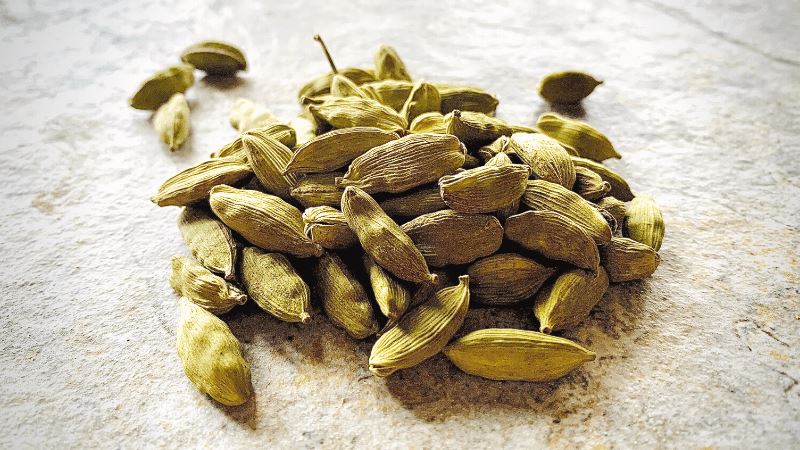Blog
What is the benefit of black cardamom?

Black cardamom (Elettaria cardamomum Maton var. major), also known as badi elaichi in India, is a spice shrouded in mystery and intrigue. Unlike its more common green cousin, black cardamom boasts a larger pod, a smoky and camphoraceous aroma, and a more intense flavor profile. But beyond its culinary applications, black cardamom has captured the attention of natural health enthusiasts for its purported health benefits. Let’s delve into the potential benefits of black cardamom, exploring scientific evidence and traditional uses.
Aromatic Powerhouse: Digestive Aid and Antimicrobial Properties
Black cardamom’s essential oil is believed to possess properties that can aid digestion. Studies suggest that the oil may stimulate the secretion of digestive enzymes, promoting better nutrient absorption and reducing symptoms of bloating and indigestion. Additionally, the oil’s antimicrobial properties might help combat harmful bacteria in the gut, contributing to a healthier digestive environment. However, more research is required to solidify these claims.
A Breath of Fresh Air: Respiratory Support and Oral Health
Traditional medicine systems like Ayurveda have long utilized black cardamom for respiratory issues. The essential oil’s decongestant properties may offer relief from symptoms of coughs, colds, and congestion. Furthermore, black cardamom’s antimicrobial properties might extend to the oral cavity, potentially reducing bad breath and promoting gum health. While anecdotal evidence exists, further scientific studies are needed to fully understand the effectiveness of black cardamom for respiratory and oral health concerns.
The Spice of Life: Metabolic Health and Anti-inflammatory Potential
Black cardamom’s role in managing metabolic health is a subject of ongoing exploration. Some studies suggest that it may positively influence blood sugar control and cholesterol levels. Additionally, its anti-inflammatory properties might be beneficial for individuals with conditions like arthritis and inflammatory bowel disease. However, these studies are often preliminary, and more research is needed to confirm these potential benefits.
A Word of Caution: Moderation is Key
While black cardamom holds promise for its health benefits, it’s crucial to exercise caution. In high doses, the essential oil can irritate the stomach and mucous membranes. Pregnant and breastfeeding women should consult with a healthcare professional before consuming black cardamom due to a lack of sufficient safety data.
A Journey of Taste and Tradition: Integrating Black Cardamom into Your Life
Black cardamom’s bold flavor profile makes it a versatile culinary ingredient. It enhances savory dishes like curries, stews, and lentil soups. Black cardamom pairs beautifully with vegetables, particularly root vegetables like carrots and parsnips. For a unique twist, infuse black cardamom pods in hot beverages like tea or coffee, releasing their aromatic notes and adding a subtle smoky depth.
The Future of Black Cardamom: Research and Responsible Sourcing
Black cardamom presents a fascinating case study in the intersection of culinary tradition, potential health benefits, and sustainable practices. Further scientific exploration is necessary to solidify its role as a natural health aid. Additionally, sustainable sourcing practices are crucial to ensure the future availability of this unique spice. By supporting ethical growers and promoting responsible harvesting methods, we can preserve the cultural heritage and potential health benefits associated with black cardamom.
Black cardamom, with its intense aroma and smoky flavor, offers more than just a culinary punch. Traditional medicine systems have long used it for various ailments, and recent scientific exploration is uncovering potential health benefits.
Black cardamom’s essential oil may aid digestion by stimulating enzyme production, potentially reducing bloating and indigestion. Its antimicrobial properties might combat harmful gut bacteria, promoting a healthier digestive environment. Studies suggest it could also support respiratory health by acting as a decongestant and potentially aiding oral health with its antimicrobial properties.
Furthermore, black cardamom holds promise in managing metabolic health. Early research indicates it might positively influence blood sugar control and cholesterol levels. Its anti-inflammatory properties also warrant further investigation for conditions like arthritis. However, moderation is crucial. High doses of the essential oil can irritate the stomach, and pregnant or breastfeeding women should consult a healthcare professional before consumption.
Black cardamom’s bold flavor complements curries, stews, and lentil dishes. It adds a unique touch to root vegetables and infuses beverages with a smoky aroma. As research progresses and sustainable sourcing practices are implemented, black cardamom stands poised to bridge the gap between culinary tradition and potential health benefits, offering a flavorful and potentially health-supportive addition to our lives.
In conclusion, black cardamom offers a unique flavor profile and a wealth of potential health benefits. While more research is required to definitively confirm its effectiveness, its traditional uses and ongoing scientific exploration paint an intriguing picture. As we embrace culinary adventure and delve deeper into the world of natural remedies, black cardamom stands poised to play a captivating role in our journey towards a healthier and more flavorful life.
FAQ:
1. What is black cardamom, and how does it differ from green cardamom?
Black cardamom has larger pods, a smoky aroma, and a more intense flavor compared to green cardamom’s bright, citrusy notes.
2. What are the potential health benefits of black cardamom?
It may aid digestion, fight gut bacteria, support respiratory health, and even influence metabolic health (limited research).
3. How does black cardamom help with digestion?
The essential oil might stimulate digestive enzymes, reducing bloating and indigestion.
4. Can black cardamom help with respiratory issues?
Its decongestant properties might offer relief from coughs, colds, and congestion (traditional use, needs more research).
5. Is black cardamom good for oral health?
The antimicrobial properties might combat bad breath and promote gum health (limited research).
6. Can black cardamom help manage blood sugar and cholesterol?
Early studies suggest it may, but more research is needed.
7. Are there any side effects to black cardamom?
High doses can irritate the stomach. Pregnant or breastfeeding women should consult a doctor before consuming.
8. How can I use black cardamom in cooking?
It enhances curries, stews, lentil dishes, and pairs well with root vegetables.
9. Can I use black cardamom in beverages?
Yes, infuse pods in tea or coffee for a smoky aromatic touch.
10. How can I find black cardamom?
Look for it in specialty grocery stores or online retailers selling ethnic ingredients.




This blog is a goldmine of information! Whether you’re a beginner or an expert in the subject matter, there’s always something new to learn.
Bravo! This blog sets the bar high for quality content. Keep shining!
Amazing write-up! Your advice on career growth is very helpful.